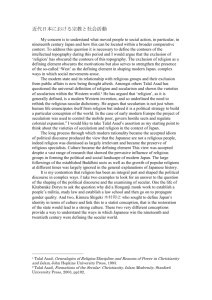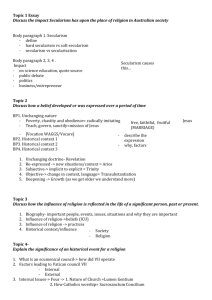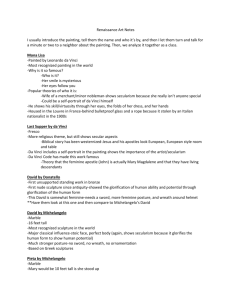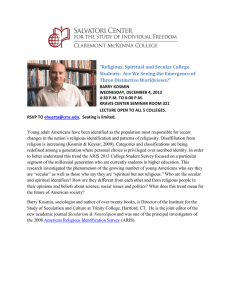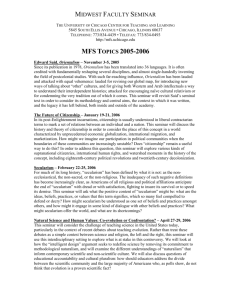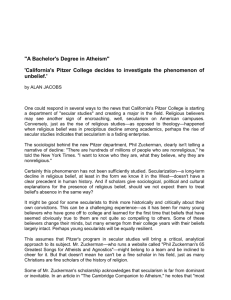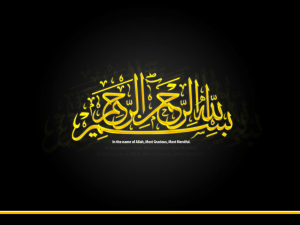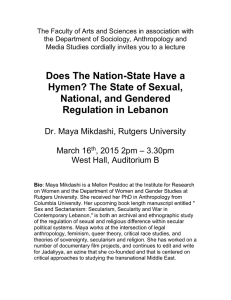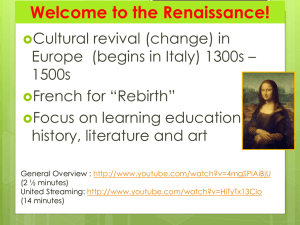ANTH118A SECULARISM, RELIGION, AND MODERNITY Course Syllabus Spring 2016
advertisement
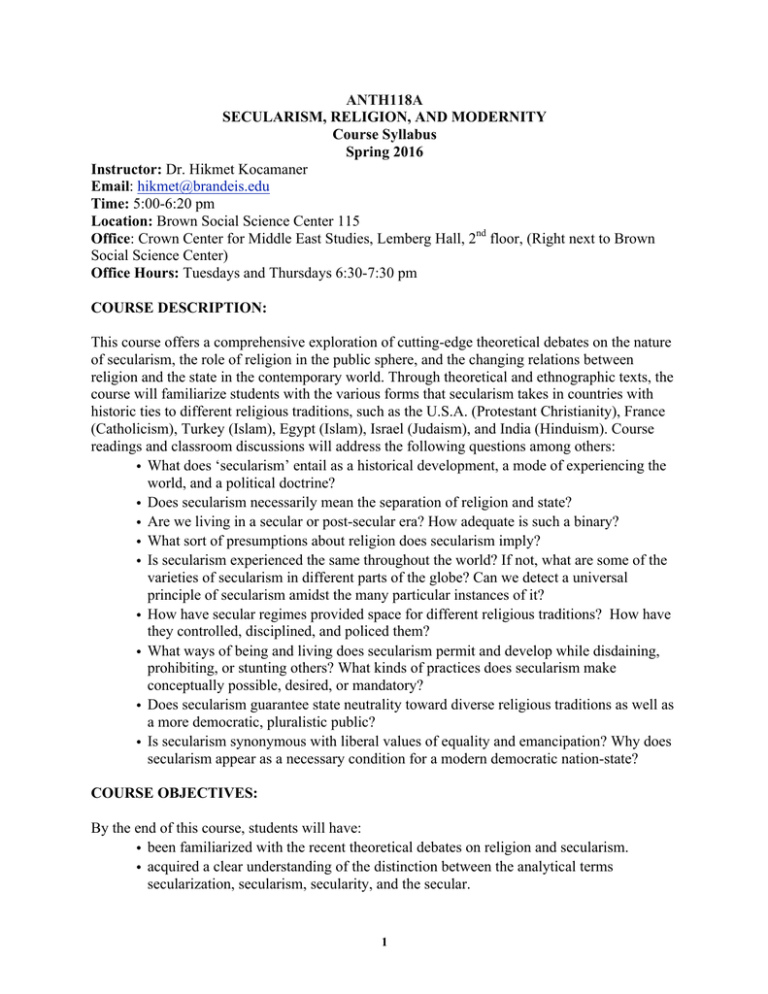
ANTH118A SECULARISM, RELIGION, AND MODERNITY Course Syllabus Spring 2016 Instructor: Dr. Hikmet Kocamaner Email: hikmet@brandeis.edu Time: 5:00-6:20 pm Location: Brown Social Science Center 115 Office: Crown Center for Middle East Studies, Lemberg Hall, 2nd floor, (Right next to Brown Social Science Center) Office Hours: Tuesdays and Thursdays 6:30-7:30 pm COURSE DESCRIPTION: This course offers a comprehensive exploration of cutting-edge theoretical debates on the nature of secularism, the role of religion in the public sphere, and the changing relations between religion and the state in the contemporary world. Through theoretical and ethnographic texts, the course will familiarize students with the various forms that secularism takes in countries with historic ties to different religious traditions, such as the U.S.A. (Protestant Christianity), France (Catholicism), Turkey (Islam), Egypt (Islam), Israel (Judaism), and India (Hinduism). Course readings and classroom discussions will address the following questions among others: • What does ‘secularism’ entail as a historical development, a mode of experiencing the world, and a political doctrine? • Does secularism necessarily mean the separation of religion and state? • Are we living in a secular or post-secular era? How adequate is such a binary? • What sort of presumptions about religion does secularism imply? • Is secularism experienced the same throughout the world? If not, what are some of the varieties of secularism in different parts of the globe? Can we detect a universal principle of secularism amidst the many particular instances of it? • How have secular regimes provided space for different religious traditions? How have they controlled, disciplined, and policed them? • What ways of being and living does secularism permit and develop while disdaining, prohibiting, or stunting others? What kinds of practices does secularism make conceptually possible, desired, or mandatory? • Does secularism guarantee state neutrality toward diverse religious traditions as well as a more democratic, pluralistic public? • Is secularism synonymous with liberal values of equality and emancipation? Why does secularism appear as a necessary condition for a modern democratic nation-state? COURSE OBJECTIVES: By the end of this course, students will have: • been familiarized with the recent theoretical debates on religion and secularism. • acquired a clear understanding of the distinction between the analytical terms secularization, secularism, secularity, and the secular. 1 • learned that secularism takes different forms in different contexts • attained familiarity with the varieties of secularism predominant in the American, French, Turkish, Egyptian, Israeli, and Indian contexts. • read theoretical as well as ethnographic texts explicating how secularism organizes, disciplines, and polices public life, cultural practices, behavior, gender, and sexuality. • conducted ethnographic research on campus or the Boston area on an aspect of secularization, secularism, or secularity discussed in the course readings and shared their findings in an oral presentation as well as a final paper. COURSE MATERIAL: — Joan W. Scott. (2010). The Politics of the Veil. Princeton: Princeton University Press. — Mayanthi L. Fernando. (2014). The Republic Unsettled: Muslim French and the Contradictions of Secularism. Durham: Duke University Press. — Yael Navaro-Yashin. (2002). Faces of the State: Secularism and Public Life in Turkey. Princeton: Princeton University Press. Additional required readings include articles and book chapters that will be posted to LATTE. COURSE REQUIREMENTS: Attendance (5%): Absences are permitted only in cases of sickness or real emergencies, for which you must provide written notification. You are allowed 2 undocumented absences throughout the semester without any penalty. If you attend all class sessions (or do not miss more than 2 sessions), you will automatically earn 5%. Absences beyond that will result in the deduction of points from your grade. You will lose 2 points from your grade for each unexcused absence beyond 2 absences. So, if you were absent for 3 sessions, your attendance grade will be cut down to 3 points. If absent for 4 times, your grade will be cut down to 1 point. Absences beyond 4 times will be deducted from your overall grade. You may fail the course if you are absent more than 6 sessions. Late policy: Arriving more than 10 minutes late to any class will count as an absence (unless there is a snow storm). Persistent lateness will not be tolerated. Participation (10%): This is an intensive discussion course. Each student is required to complete reading assignments on time and participate in every class discussion. Please read the following piece for tips on how to participate in classroom discussions: https://www.brandeis.edu/das/committees/cst/How%20to%20Participate%20In%20Class.docx Note: If you have a speech impediment or find it challenging to talk in public due to social anxiety, please notify me as soon as possible. I will arrange an alternative way to assess your participation. Online Discussions (10%): Every weekend, you are required to discuss the previous week’s material on the discussion forums available on LATTE. The discussion forum will be available from Friday until Sunday midnight. In this discussion forum, you should present your thoughts 2 on that week’s theme, theory, and concepts. You may pose a question to your group or offer a thoughtful comment on that topic. Be creative! If it is a topic you have personal experience with, feel free to share your stories, direct us to useful links or readings, post photos, videos, etc. Make sure to have at least 2 comments within that week’s discussion thread. Each comment should be at least 4 sentences. By the end of the semester, you should have contributed at least 10 out of the 12 available weeks. Response papers on course readings (25%): Throughout the course, you are required to write 5 response papers, in which you will summarize and evaluate the arguments of the assigned text(s). Each essay is worth 5 points. If there is more than one text assigned for the day you choose, your essay should refer to all of those readings. Your response paper is due the night before the day for which the text is assigned (For Tuesday courses, it is due Monday midnight. For Thursday courses, it is due Wednesday midnight.) Your essay should be minimum 350 words and maximum 500 words. It should include all of the following components: 1) a summary of the main points in the article (2 points) — a breakdown of the author’s theoretical framework and methodology — summary of key concepts and terminology 2) a critique of the argument (1 point) — Make sure to present evidence to support your critique — Feel free to refer to other readings/examples/material, etc. 3) 2 discussion questions for class (2 points) — I will bring up your questions in class. So, make sure that your questions are intelligent, stimulating, and thought-provoking. Oral presentation (10%): In pairs of two, you will be asked to present the assigned readings and lead the discussion on a day of your choice. Your presentation should demonstrate collective effort. You and your peer should complete the assigned readings for the week rather than dividing them up individually. As part of your preparation, you are responsible for preparing a handout, minimum 2 pages, which should include the same components mentioned above but at least 3 discussion questions. Please email me the discussion questions by noon on the day before our class meets. I will post a sign up sheet on LATTE where you can write your name under a topic of your choice. If there are already two people signed up for that topic, then choose another topic. Final project prospectus (10%): You will choose a research site in the Boston area and do ethnographic field research in this site throughout the semester. So choose this site wisely. Your research will explore any aspect of secularization, secularism, or secularity discussed in the course readings. Your project prospectus comprises 2 parts: 1) Getting my approval about the research site: Make an appointment to see me during my office hours. The night before our meeting, email me a paragraph or two addressing: a) which research site you chose, b) why you chose this particular site/why it is significant, c) what topics or questions you would like to explore, d) why it is important to study these topics and questions. You should have received my approval by February 5th. This date might seem too early but it is important to start thinking about your research topic early in the semester. After doing some 3 preliminary research and thinking, you may discover that it will not work well for the assignment. You may even end up going through 2 or 3 possible topics before you settle on one that satisfies you. This does not mean you are wasting your time. Formulating and reformulating your research problem is an essential part of the research process. 2) Research Proposal: You will submit a proposal for your final research projects. The proposal should be maximum 1000 words (excluding the annotated bibliography) and address the following: — Describe your research topic, question/hypothesis, and research objective. What will the focus of your investigation be? — How does your research address the issues discussed so far in the course? — What evidence will you need to collect to answer your research question? How will you go about collecting and analyzing this evidence? What are some of your preliminary findings? — Include an annotated bibliography of at least 5 academic sources that are not listed in the course syllabus (books, peer-review journal articles, chapters from edited volumes, etc.) You are expected to write a brief paragraph about each selected source to explain why it is relevant to your research topic. These proposals are due February 22nd on LATTE. Final Paper (30%): This will be a research paper that combines your ethnographic research with the course readings and other related sources to explore issues of religion and secularism in your selected field site. The paper will be 10-12 pages for undergraduates and 15-20 pages for graduate students. Detailed guidelines will be available later in the semester. It is due May 5th at 11.59 pm, and it should be submitted on LATTE. GRADING: Attendance: 5% Participation: 10% Online Discussion: 10% Response Essays: 25% (5 papers x 5% each) Oral presentation: 10% Final Project Prospectus: 10% Final Paper: 30% Graduate students: Same requirements. But they will write a 15 or 20-page paper instead. ASSIGNMENT POLICIES: All written assignments must be carefully proofread, double-spaced, typed in Times New Roman size 12 font with a 1-inch margin all around, and uploaded to LATTE. Late assignment and paper submissions will not be accepted except in cases of emergency and illness, which need to be documented. You are expected to notify me at least 24 hours in advance 4 if you are unable to submit your work on time in order to receive consideration. You will lose points from your final grade for each day that your work is past the due date. All late assignments will be penalized with a late penalty of -5% per day, including weekends, and will not be accepted after 3 days late. ILNESSES AND EMERGENCIES: If an illness, injury, or other emergency impacts your coursework, it is your responsibility to contact the instructor as soon as possible to discuss whether it would be in your best interest to drop the course or to immediately arrange an alternative assignment or deadline. Any changes must be supported by documentation verifying sufficient cause, and settled in writing between the student and the instructor. COURSE LOAD: Success in this 4 credit hour course is based on the expectation that students will spend a minimum of 9 hours of study time per week in preparation for class (readings, papers, preparation for exams, etc.) CLASSROOM CONDUCT: I expect you to be quiet and listen respectfully when I am or one of your peers is talking. While discussions might get heated, please do not treat your classmates with disrespect. As for the use of technology, you are only allowed to use computers or tablets to take notes. Mobile phones, iPods, and other similar devices must be silenced and remain unused during class periods. Absolutely NO FACEBOOK, TWITTER, WEB-SURFING, or TEXTING in class! STUDENTS WITH DISABILITIES: If you are a student with a documented disability on record at Brandeis University and wish to have a reasonable accommodation made for you in this class, please see me immediately. ACADEMIC INTEGRITY: The University holds students accountable for the integrity of the work they submit. Students should be familiar with the University’s policy on academic dishonesty, and be familiar with general academic expectations with regard to plagiarism and the proper citation of sources in written work. The policy also governs the integrity of work submitted in exams and assignments as well as the veracity of signatures on attendance sheets and other verifications of participation in class activities. Serious sanctions can result from academic dishonesty of any sort. If I find out that you have violated the integrity policy, you will receive an F on that assignment and possibly for the course. This will be accompanied by a formal complaint to the Director of Academic Integrity. 5 COURSE SCHEDULE: Note: The reading list is subject to change. Please check back the week before each session for an updated list. 1) Thursday, January 14 — Introduction — Course introduction. No assigned readings. 2) Tuesday, January 19 — Defining the Terms: Secularism, Secularization, Secularity, and the Secular — José Casanova. (2011). “The Secular, Secularizations, Secularisms.” in Rethinking Secularism. Craig Calhoun (eds. et al.) Oxford and New York: Oxford University Press, pp. 54-74. [Available online through the library website] — Charles Taylor. (2010). “The Meaning of Secularism,” The Hedhog Review. Fall 2010. Available Online: <http://iasc-culture.org/THR/THR_article_2010_Fall_Taylor.php> 3) Thursday, January 21 — Defining the Terms (Continued) — Charles Taylor. (2011). “Western Secularity” in Rethinking Secularism. Craig Calhoun (eds. et al.) Oxford and New York: Oxford University Press, pp. 31-53 [Available online through the library website] — Akeel Bilgrami. (2014). “Secularism: Its Content and Context.” Journal of Social Philosophy 45.1 (2014): 25-48. [Available on LATTE] 4) Tuesday, January 26 —Are We Living in a Secular Age? — Charles Taylor. (2007). “Introduction” to A Secular Age. Cambridge: Harvard University Press, pp. 1- 22. [Available on LATTE] — Warner, Michael (eds. et al.) (2010). “Editor’s Introduction” to Varieties of Secularism in a Secular Age. Cambridge, MA: Harvard U Press. [Available on LATTE] 5) Thursday, January 28 — Are We Living in a Post-Secular Age? — Jurgen Habermas, et al. (2010). An Awareness of What is Missing: Faith and Reason in a Post-Secular Age. London: Polity Press. Chapters 1 and 2, pp.1-23. [On LATTE] — David Kyuman Kim (eds. et. al.) (2012.) “Introduction” The Post-Secular in Question: Religion in Contemporary Society. New York: NYU Press, pp. 1-23. [On LATTE] 6) Tuesday, February 2 — Secularization Thesis — José Casanova. (1994). “Secularization, Enlightenment, and Modern Religion” Public Religions in the Modern World. Chicago: University of Chicago Press. [On LATTE] — José Casanova. (2006) “Rethinking Secularization: A Global Comparative Perspective.” The Hedgehog Review, Spring/Summer 2006, pp. 7-22. [On LATTE] 6 — Peter Berger. (1999). “Introduction” to The Desecularization of the World: Resurgent Religion and World Politics. Washington, D.C.: Ethics and Public Policy Center. [On LATTE] 7) Thursday, February 4 — Religious Symbols in a Secular Public: The Case of the Islamic Veil IMPORTANT NOTE: Our class will be open to public that day as part of Brandeis University’s fifth annual weeklong "festival of social justice," known as 'DEIS Impact. Instead of our regular location, we will meet at Shapiro Campus Center Multipurpose Room on the 2nd floor. While doing the readings, think about how the display of religious attire or symbols could be a matter of social justice. We will focus on the Islamic headscarf as a case study. But feel free to think about other religious attire and symbols such as yarmulke, star of David, sikh turbans, crosses, or the crucifix. To learn more about DEIS Impact, visit: <http://www.brandeis.edu/ethics/deisimpact/index.html> — Talal Asad. (2006). “French Secularism and the ‘Islamic Veil Affair’” The Hedgehog Review, Spring/Summer 2006 [On LATTE] — Joan W. Scott. (2010). The Politics of the Veil. Princeton: Princeton University Press. (Introduction and Chapter 1) — Alev Çınar. (2008). “Subversion and Subjugation in the Public Sphere: Secularism and the Islamic Headscarf” Signs, 33, (4): 891-913. [On LATTE] — European Court of Human Rights (2011). “Case of Lautsi and Others v. Italy: Judgment.” Application no. 30814/06 Strasbourg, 18 March 2011. [On LATTE; You don’t need to read in detail but make sure to skim through it and pay attention to what kind of juridical arguments are made with regard to secularism.] 8) Tuesday, February 9 — Religious Symbols in a Secular Public (Continued) — Joan W. Scott. (2010). The Politics of the Veil. Princeton: Princeton University Press. (Chapter 2, 3, 4, and Conclusion) 9) Thursday, February 11 — Reconfiguring Secularism as a Political Doctrine — Charles Taylor. (2011). “Why We Need a Radical Reconceptualization of Secularism” in The Power of Religion in the Public Sphere. New York: Columbia University Press, pp. 34-59. [On LATTE] — Saba Mahmood (2010). “Can Secularism be Otherwise?” in Varieties of Secularism in a Secular Age. Cambridge: Harvard University Press, pp. 282-300. [On LATTE] 10) Tuesday, February 16 — No class. Midterm Recess. 11) Thursday, February 18 — No class. Midterm Recess. DEADLINE: Monday, February 22 — FINAL PROJECT PROSPECTUS DUE! 7 12) Tuesday, February 23 — Reconfiguring Secularism (Continued) — Rajeev Bhargava. (2011). “Rehabilitating Secularism.” In Rethinking Secularism. Craig Calhoun (eds. et al.) Oxford: Oxford University Press. [Available Online through the library website] — Talal Asad. (2003). “Introduction” to Formations of the Secular: Christianity, Islam, Modernity. Stanford: Stanford University Press. [On LATTE] 13) Thursday, February 25 — Anthropology of Secularism — Talal Asad. (2003). “What Might an Anthropology of Secularism Look Like?” in Formations of the Secular: Christianity, Islam, and Modernity. Stanford, CA: Stanford University Press. [On LATTE] — Fenella Cannell. (2010). “The Anthropology of Secularism.” Annual Review of Anthropology, 39:85–100. [On LATTE] — Gregory Starrett. (2010). “The Varieties of Secular Experience.” Comparative Studies in Society and History 52 (3): 626-651 [On LATTE] 14) Tuesday, March 1 — Is Islam a Threat to Europe’s Secularity? — Hasan Azad. (2015). “Do Muslims Belong in the West? An Interview with Talal Asad.” Jadaliyya, 3 February 2015. <http://www.jadaliyya.com/pages/index/20768/do-muslimsbelong-in-the-west-an-interview-with-ta> — Nilufer Gole. (2015) “Europe’s Trouble with Islam: What Future?” Islam and Secularity. Durham: Duke University Press. [On LATTE] — Oliver Roy. (2006) “Islam in the West or Western Islam? The Disconnect of Religion and Culture” The Hedgehog Review, Spring/Summer 2006, pp. 127-132. [On LATTE] 15) Thursday, March 3 — Secularism and Religious Conversion — Esra Özyürek. (2005) “The Politics of Cultural Unification, Secularism and the Place of Islam in the New Europe.” American Ethnologist 32: 509–512. — Esra Özyürek. (2009) “Convert Alert: German Muslims and Turkish Christians as Threats to Security in the New Europe.” Comparative Studies in Society and History 51: 91–116. 16) Tuesday, March 8 — Secularism and the Nation-state — Talal Asad. (2003) “Secularism, Nation-State, Religion” in Formations of the Secular: Christianity, Islam, Modernity. Stanford: Stanford University Press, pp. 181-201. [On LATTE] — Akeel Bilgrami, (1998) “Secularism, Nationalism, and Modernity” in Secularism and its Critics. Rajeev Bhargava (ed), New Delhi: Oxford University Press, pp. 380-418 [On LATTE] 8 17) Thursday, March 10 — Secularism and the Nation-state (Continued) — Yael Navaro-Yashin. 2002. Faces of the State: Secularism and Public Life in Turkey. Princeton: Princeton University Press. (Introduction, Chapter 1, Chapter 2). 18) Tuesday, March 15 — Secularism and the State (Continued) — Yael Navaro-Yashin. 2002. Faces of the State: Secularism and Public Life in Turkey (Chapters 3 and 6). 19) Thursday, March 17 — Laiklik: Secularism in Turkey — Taha Parla and Andrew Davison (2008). “Secularism and Laicism in Turkey.” World Secularisms at the Millennium. J. R. P. Jakobsen, Ann Pellegrini (eds.) Durham: Duke University Press. [On LATTE] — Kim Shively. (2008). “Taming Islam: Studying Religion in Secular Turkey.” Anthropological Quarterly 81 (3):683-711. [On LATTE] 20) Tuesday, March 22 — Laïcité: Secularism in France — Mayanthi L. Fernando. (2014). The Republic Unsettled: Muslim French and the Contradictions of Secularism. Durham: Duke University Press. (First half the book) 21) Thursday, March 24 — Laïcité — Myriam Cerrah-Francois. (2015). “Olivier Roy on Laïcité as Ideology, the Myth of 'National Identity' and Racism in the French Republic” Jadaliyya, May 16 2015. http://www.jadaliyya.com/pages/index/21640/olivier-roy-on-laicite-as-ideology-themyth-of-nat — Mayanthi L. Fernando. (2014). The Republic Unsettled: Muslim French and the Contradictions of Secularism. Durham: Duke University Press. (Second half the book) 22) Tuesday, March 29 — Indian Secularism — Thomas Pantham. (1997). “Indian Secularism and Its Critics: Some Reflections.” The Review of Politics, 59 (3): 523-540. [On LATTE] — Ashis Nandy (1995). “An Anti-secularist Manifesto” India International Centre Quarterly 22 (1): 35–64. [On LATTE] 23) Thursday, March 31 — Indian Secularism — Rajeev Barghava. (2006). “The Distinctiveness of Indian Secularism” in The Future of Secularism. T.N. Srinivasan (ed.) Delhi: Oxford University Press. Available Online: http://www.chereum.umontreal.ca/activites_pdf/session%202/Barghava_Distinctiveness %20of%20Indian.pdf 9 — Haley Duschinski (2007). “‘India Displacing Indians for the Sake of India’: Kashmiri Hindu Migrant Vendors and the Secular State.” PoLAR: Political and Legal Anthropology Review, 30 (1): 90-108 [On LATTE] 24) Tuesday, April 5 — Is Egypt a Secular or a Religious State? — Hussein Agrama. (2010). “Secularism, Sovereignty, Indeterminacy: Is Egypt a Secular or a Religious State?” Comparative Studies in Society and History, 52(3): 1-29. [On LATTE] 25) Thursday, April 7 — Secularism and Judaism — Andrew Buckser. (2011). “Secularization, Religiosity, and the Anthropology of Jewry.” Journal of Modern Jewish Studies, 10(2):205-222. [On LATTE] — Laura Levitt. (2008). “Other Moderns, Other Jews: Revisiting Jewish Secularism in America” in Secularisms. J. R. Jakobsen & A. Pelligrini (Eds.) Durham: Duke University Press. [On LATTE] — Guy Ben-Porat. (2000). “A State of Holiness: Rethinking Israeli Secularism” Alternatives: Global, Local, Political, 25 (2): 223-245 [On LATTE] 26) Tuesday, April 12 — Secularism, Gender, and Sexuality — Joan W. Scott. (2010). “Sexuality” The Politics of the Veil. (Chapter 5) — Saba Mahmood. (2013). “Sexuality and Secularism.” In Linnel E. Cady and Tracy Fessenden, Religion, the Secular, and the Politics of Sexual Difference. New York: Columbia University Press. [On LATTE] 27) Thursday, April 14 — Secular Subjectivity, Embodying the Secular — Charles Hirschkind (2011). “Is There a Secular Body?” Cultural Anthropology, 26(4): 633647. [On LATTE] — Talal Asad (2011). “Thinking about the Secular Body, Pain, and Liberal Politics.” Cultural Anthropology, 26(4): 657-675. [On LATTE] — Esra Ozyurek. (2007). “Miniaturizing Ataturk: The Commodification of State Iconography.” Nostalgia for the Modern: State Secularism and Everyday Politics in Turkey. Durham: Duke University Press. [On LATTE] 28) Tuesday, April 19 — Course Overview 29) Thursday, May 5— FINAL PAPER DUE 10
